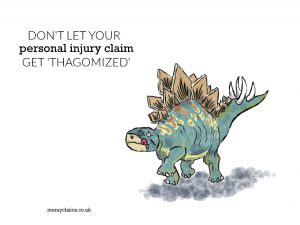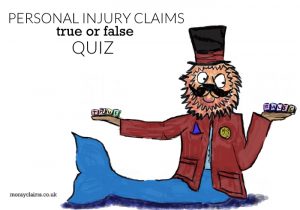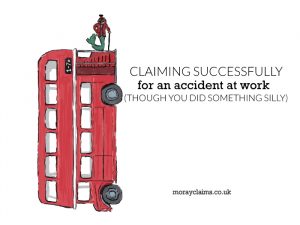Do you know what a thagomizer is? The thagomizer is an arrangement of 4 to 10 spikes on the tails of dinosaurs such as the Stegosaurus. The pointy bits provided a defensive weapon against predators. Stegosaurus was a herbivore. With a toothless beak and small teeth, it was not designed to eat flesh. Legendary cartoonist, Gary Larson, coined the term ‘thagomizer’ in his 1982 image of a caveman giving a PowerPoint presentation to colleagues and telling them it was so-called “after the late Thag Simmons”. Poor Thag. ‘Thagomizer’ has come to be adopted as an informal anatomical term. It’s used on the Stegosaurus display at the Smithsonian Institute in Washington D.C.. Clearly, Stegosaurus had a mighty sting in the tail, if required. Personal injury claims can have a sting in the tail too, if you don’t watch out. The cruel defence is one of ‘delay’. Wait too long and your claim will become unenforceable and lost forever. As we have discussed elsewhere, the Continue Reading
Personal Injury Claims True or False Quiz
Here are 12 questions about personal injury claims in Scotland. There are some local, Moray elements thrown in too. This covers things like: At the end, we'll tell you your score and the answers. Should have any questions at all, please get in touch with us. All enquiries are free of charge and without obligation. See the article HERE, if you want to understand more about what will actually happen if you get in touch with us about making a personal injury compensation claim in Moray. Continue Reading
Restarting Personal Injury Claims in the Sheriff Court
Personal injury claims in the Sheriff Court are more or less at a standstill. Though the lockdown was quite sudden when it came, in some ways, it had been predicted. Scottish Courts and Tribunal Service (SCTS) had been making positive noises about how it might be possible to keep the litigation process going by means of telephone conferencing or written submissions. However, the guidance issued for Sheriff Courts on 25 March 2020 indicated that only essential court business would proceed. For most types of civil court business – including personal injury and family law cases – the litigation process was frozen. Civil court hearings for personal injury actions scheduled for final hearings with witnesses between March and June 2020 were postponed. This applies across all Sheriff Courts, including our own local Elgin Sheriff Court. There has been criticism of the apparent slowness of the courts to adapt. Here's a report from the website of the Law Society of Continue Reading
Claiming successfully for an accident at work though you did something silly
Have you ever panicked that you have mislaid your mobile phone? And that while you are in the middle of a conversation with someone on your mobile phone? This happens to me regularly. So many things compete for our attention and so much of the activity that fills our day is done almost unconsciously, on autopilot. The repetitiveness of everyday life dulls our concentration and our short-term memories. Sometimes distractions can be a source of danger, whether that’s while you’re descending the stairs in your house or crossing the street or working on a production line. In this article we are going to concentrate on accidents at work. We will look at 3 different accident scenarios where you might think the injured employee 'should have known better' yet still claimed successfully. Firstly, we’ll look at the case of the exposed window cleaner. Then, we’ll go on to consider the case of the labourer with inappropriate footwear. Finally, we’ll go over the case of the bus Continue Reading



